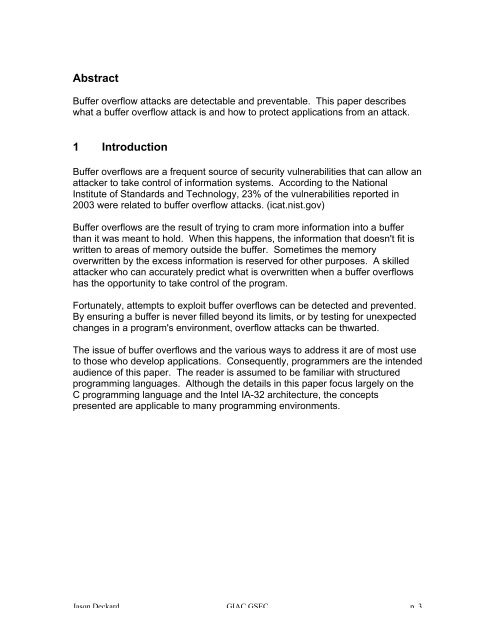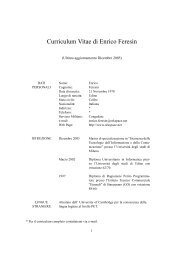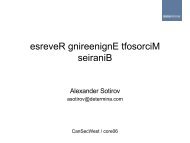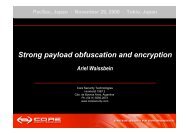Defeating Overflow Attacks - orkspace.net
Defeating Overflow Attacks - orkspace.net
Defeating Overflow Attacks - orkspace.net
You also want an ePaper? Increase the reach of your titles
YUMPU automatically turns print PDFs into web optimized ePapers that Google loves.
Abstract<br />
Buffer overflow attacks are detectable and preventable. This paper describes<br />
what a buffer overflow attack is and how to protect applications from an attack.<br />
1 Introduction<br />
Buffer overflows are a frequent source of security vulnerabilities that can allow an<br />
attacker to take control of information systems. According to the National<br />
Institute of Standards and Technology, 23% of the vulnerabilities reported in<br />
2003 were related to buffer overflow attacks. (icat.nist.gov)<br />
Buffer overflows are the result of trying to cram more information into a buffer<br />
than it was meant to hold. When this happens, the information that doesn't fit is<br />
written to areas of memory outside the buffer. Sometimes the memory<br />
overwritten by the excess information is reserved for other purposes. A skilled<br />
attacker who can accurately predict what is overwritten when a buffer overflows<br />
has the opportunity to take control of the program.<br />
Fortunately, attempts to exploit buffer overflows can be detected and prevented.<br />
By ensuring a buffer is never filled beyond its limits, or by testing for unexpected<br />
changes in a program's environment, overflow attacks can be thwarted.<br />
The issue of buffer overflows and the various ways to address it are of most use<br />
to those who develop applications. Consequently, programmers are the intended<br />
audience of this paper. The reader is assumed to be familiar with structured<br />
programming languages. Although the details in this paper focus largely on the<br />
C programming language and the Intel IA-32 architecture, the concepts<br />
presented are applicable to many programming environments.<br />
Jason Deckard GIAC GSEC p. 3






